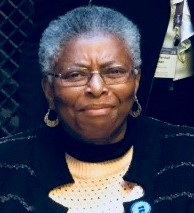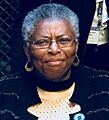Katie Cannon facts for kids
Quick facts for kids
Katie Cannon
|
|||||||||
|---|---|---|---|---|---|---|---|---|---|
 |
|||||||||
| Born |
Katie Geneva Cannon
January 3, 1950 Kannapolis, North Carolina, US
|
||||||||
| Died | August 8, 2018 (aged 68) Richmond, Virginia, U.S.
|
||||||||
|
|||||||||
| Alma mater |
|
||||||||
| Scientific career | |||||||||
| Institutions |
|
||||||||
| Thesis | Resources for a Constructive Ethic for Black Women with Special Attention to the Life and Work of Zora Neale Hurston (1983) | ||||||||
| Doctoral students | Stacey M. Floyd-Thomas | ||||||||
| Influences |
|
||||||||
| Influenced | Ada María Isasi-Díaz | ||||||||
Katie Geneva Cannon (January 3, 1950 – August 8, 2018) was an important American Christian thinker. She was a theologian, which means she studied religious beliefs. She was also an ethicist, someone who studies what is right and wrong.
Katie Cannon was a leader in womanist theology and black theology. These are ways of understanding faith that focus on the experiences of Black women and Black people. In 1974, she made history. She became the first African-American woman to be ordained as a minister in the United Presbyterian Church (USA).
Contents
Early Life and Background
Katie Cannon was born on January 3, 1950. She grew up in Kannapolis, North Carolina. This community was racially segregated when she was young. This meant that Black people could not use the same public places as white people. For example, she could not use the local YMCA, swimming pool, or library.
Her parents were Esau and Corine L. Cannon. Her mother was the first woman to work at the local Cannon Mills. Both of her parents were leaders in their Presbyterian Church. Katie had six brothers and sisters.
Education and Career
Katie Cannon was a dedicated student. She earned her first degree from Barber–Scotia College. Then, she went on to get more advanced degrees. She studied at Johnson C. Smith Theological Seminary and Union Theological Seminary in New York.
On April 24, 1974, Katie Cannon became a minister. This happened in Shelby, North Carolina. She was the first African-American woman to be ordained in the United Presbyterian Church (USA). After her ordination, she worked at Ascension Presbyterian Church in New York.
Teaching and Leadership
Katie Cannon also had a long and successful career as a professor. In 2001, she started teaching at Union Presbyterian Seminary in Richmond. She was a professor of Christian Social Ethics. Before this, she taught at other well-known schools. These included Temple University, Episcopal Divinity School, and Harvard Divinity School.
She also taught as a visiting professor at Davidson College and Williams College. Katie Cannon worked with other scholars, including African women theologians. She helped start the Circle of Concerned African Women Theologians.
In 2012, Katie Cannon began a special project. It was called the Squaring the Womanist Circle Project. This project led to the creation of The Center For Womanist Leadership. This center is at Union Presbyterian Seminary. It was the first center of its kind at any theological school in the United States. From 2004 to 2008, she was the president of the Society for the Study of Black Religion.
Awards and Recognition
Katie Cannon received many awards for her important work. Spelman College gave her a distinguished professor award. She also received the Lucy Craft Laney Award. The American Academy of Religion honored her with its 2011 Excellence in Teaching Award.
In 2018, the Presbyterian Church (USA)'s General Assembly honored her. She received the Excellence in Theological Education Award. As her final wish, Katie Cannon helped create the Center for Womanist Leadership in April 2018. After she passed away, it was renamed The Katie Geneva Cannon Center for Womanist Leadership. Katie Cannon died on August 8, 2018.
Influence on Womanist Theology
Katie Cannon is known as one of the people who started womanist theology and ethics. She believed it was important to use the experiences and knowledge of Black women to understand right and wrong.
Scholar Traci C. West explained Katie Cannon's ideas. She said that Katie Cannon showed the strength of Black women. She also showed how they faced challenges from racism. Katie Cannon's work helped people see how unfair racism was. She taught that Black women's knowledge was a powerful and creative force. She believed that womanist ethicists should discover and understand this knowledge.
Katie Cannon's first major book was Black Womanist Ethics. It was published in 1988. This book was very important. Many people believe it started the whole field of womanist ethics.
Images for kids
 | Toni Morrison |
 | Barack Obama |
 | Martin Luther King Jr. |
 | Ralph Bunche |


